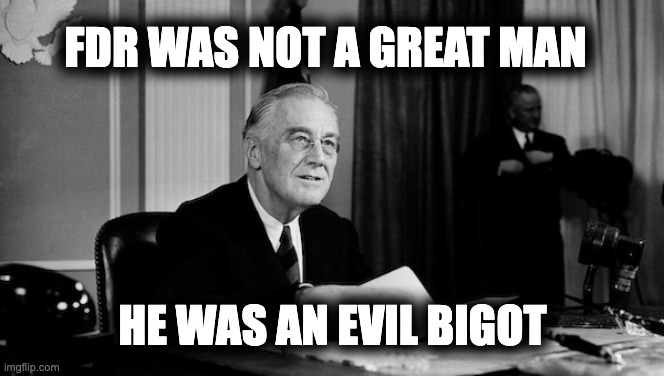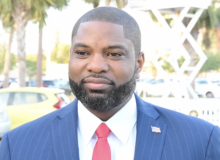FDR was the most bigoted
I’ve never understood the reverence for Franklin Delano Roosevelt. He gets points for picking great Generals and leading this country to victory in WWII. But he totally mismanaged the economy, making the great depression longer…in 1937, unemployment spiked again, reaching 19% (the previous high was 25%). His freedom-sapping policies never did get this country out of the Great Depression. He tried to circumvent constitutional separation of powers (now who does that remind me of?). And then there is the issue never discussed. FDR was a bigot, he threw Japanese-Americans in camps, and his hatred of Jews caused two hundred of thousands to be added to the ranks of Hitler’s victims.
Typically, when one asks a Democrat about FDR, they immediately develop a sense of awe that reminds me of those little green aliens (undocumented spacemen?) in the movie Toy Story. Every time they saw Buzz Lightyear.” AHHHHH!”
While other modern presidents may have been bigoted, none acted on their bigotry as much as FDR (Woodrow Wilson and Barack Obama fight for #2). Liberals will claim that FDR had many Jews in his cabinet, which is true, but it doesn’t mitigate his bigoted actions.
Japanese Internment Camps

As explained by the History Channel:
On February 19th, 1942, Roosevelt signed Executive Order 9066. Under the terms of the Order, some 120,000 people of Japanese descent living in the US were removed from their homes and placed in internment camps. The US justified their action by claiming that there was a danger of those of Japanese descent spying for the Japanese. However, more than two-thirds of those interned were American citizens and half of them were children. None had ever shown disloyalty to the nation. In some cases, family members were separated and put in different camps. During the entire war, only ten people were convicted of spying for Japan and these were all Caucasian.’
FDR’s Antisemitism Caused Holocaust Deaths
Some point to the fact that FDR didn’t bomb and destroy the train tracks shipping Jews to concentration camps? But I side with the people who say that wouldn’t have worked.
The real question to be explored is why didn’t allow more Jews fleeing the Nazis into the country, why didn’t FDR pressure Britain to cancel the White Paper of 1939 that severely restricted Jewish immigration to what was then called Palestine under the British Mandate. The paper appeased the Arabs but prevented Jews to flee from Nazi-controlled areas into their eternal homeland and why did Roosevelt create a plan for Jews after the war (called Project M) that would thinly spread the remains of European Jewry throughout the world so they couldn’t do damage or incite hatred.
In the book “FDR and the Holocaust: A Breach of Faith,” historian Rafael Medoff suggests that Roosevelt failed to take relatively simple measures that would have saved significant numbers of Jews during the Holocaust because his vision for America was one that had a small number of Jews. In other words, FDR doomed many Jew to suffer not because he wanted them to die but because he didn’t like too many of them living in his neighborhood. FDR could have permitted the immigration quotas to be filled to their legal limit. If he had, that alone would have saved 190,000 lives per Medoff.
“He [FDR] could have pressed the British to open Palestine’s doors to Jewish refugees. He could have authorized the use of empty troop-supply ships to bring refugees to stay in the U.S. temporarily, until the end of the war. He could have permitted refugees to stay as tourists in a U.S. territory, such as the Virgin Islands, until it was safe for them to return to Europe.
How do we know that FDR was an Antisemite? In a piece for the Brandies Center, Medoff shared some of the hateful/public anti-Semitic statements Roosevelt made when he let his guard down:
In 1923, as a member of the Harvard board of directors, Roosevelt decided there were too many Jewish students at the college and helped institute a quota to limit the number admitted. In 1941, he remarked that there were too many Jews among federal employees in Oregon at a Cabinet meeting.
In 1938, he privately suggested that Jews in Poland dominated the economy and were, therefore, to blame for provoking antisemitism.
In 1943, he told government officials in Allied-liberated North Africa that the number of local Jews in various professions “should be definitely limited” to “eliminate the specific and understandable complaints which the Germans bore towards the Jews in Germany.”
The most detailed of FDR’s statements about Jews was made during his meeting on January 17, 1943, in Casablanca, with leaders of the new local regime in Allied-liberated North Africa. U.S. ambassador Robert Murphy remarked that the 330,000 Jews in North Africa were “very much disappointed that ‘the war for liberation’ had not immediately resulted in their being given their complete freedom.”
(Before the war, when the Jews lived under the colonial French regime, they enjoyed rights similar to French citizens. But when the pro-Nazi Vichy French took over the French colonies in 1940, they stripped Jews of those rights. In 1943, upon the defeat of the Vichyites, the Jews had expected their rights would be restored.)
According to the official record of the conversation (later published by the U.S. government in its ‘Foreign Relations of the United States’ series), the president replied that “the number of Jews engaged in the practice of the professions (law, medicine, etc) should be definitely limited to the percentage that the Jewish population in North Africa bears to the whole of the North African population,” which “would not permit them to overcrowd the professions.”FDR explained that his plan “would further eliminate the specific and understandable complaints which the Germans bore towards the Jews in Germany, namely, that while they represented a small part of the population, over fifty percent of the lawyers, doctors, school teachers, college professors, etc, in Germany, were Jews.” (It is not clear where FDR obtained those wildly inflated statistics.)
Eugenics, as applied to Jews, seems to be FDR’s motivation for “Project M.” He asked John Franklin Carter, who ran an informal secret intelligence service for the POTUS, to help him set up the project:
Roosevelt’s first choice to head the M Project was Aleš Hrdlička, curator of physical anthropology at the Smithsonian Museum of Natural History. The two men had carried on a lively correspondence for over a decade and the President had absorbed the scientist’s theories about racial mixtures and eugenics. Roosevelt, the scion of two families that considered themselves American aristocrats, was especially attracted to Hrdlička’s notions of human racial “stock.”
But Hrdlička wouldn’t take the job because he wasn’t given complete control of the project:
Isaiah Bowman, president of Johns Hopkins University and a geographer, was promoted from his role as a member of the committee to the head of the project. Roosevelt knew Bowman well and so was presumably aware of his anti-Semitic views:
Per Johns Hopkins University, in 1939, Bowman fired Jewish faculty member Eric Goldman because he claimed, “There are already too many Jews at Hopkins.” Goldman had received a unanimous departmental vote for reappointment to his position as a professor of history. Bowman also speculated that “Jews don’t come to Hopkins to make the world better or anything like that. They came for two things: to make money and marry non-Jewish women.”
In 1942, Bowman instituted a quota on the number of Jewish students admitted to the University and restricted the number of Jewish students allowed to pursue degrees in the fields of science and math. The quota was abolished in the 1950s. In addition to his anti-Semitic beliefs, Bowman also expressed anti-black and homophobic sentiments
Bowman knew precisely what Roosevelt wanted out of Project M. Four years earlier, in 1938, he did a research project for the President, examining the prospects for European settlement in South America. In setting up the 1938 project, FDR wrote Bowman:
“Frankly, what I am rather looking for is the possibility of uninhabited or sparsely inhabited good agricultural lands to which Jewish colonies might be sent.” Roosevelt added that “such colonies need not be large but, in all probability, should be large enough for mutual cooperation and assistance—say fifty to one hundred thousand people in a given area.”
The goal of project M was very similar
Describing the M Project to UK Prime Minister Winston Churchill in 1943, Roosevelt said the study is focused on “the problem of working out the best way to settle the Jewish question,” adding that the solution “essentially is to spread the Jews thin all over the world,” rather than allow them amass in large numbers in one specific place. The conversation was recorded in the diary of Vice President Henry Wallace, who was present at the meeting.
Very few people outside the team that produced the reports were allowed to see them, which had no discernible impact on policy decisions. In retrospect, the M Project’s principal accomplishment was to shed light on how now-discredited eugenic theories influenced FDR’s thinking about race, immigration, and the Jews of Europe. As the M Project’s reports rolled into the White House, so did news about the methodical starvation, torture, and extermination of Europe’s Jews in the Nazi Holocaust.
Additionally, FDR was reluctant to speak out against the impending genocide.
On August 25 [1933] , First Lady Eleanor Roosevelt brought her friend Alice Hamilton, who had recently spent three months in Germany, to Hyde Park to give FDR a detailed eyewitness account of German brutality against the Jews. He still refused to publicly criticize Hitler.
It is sad to consider that Franklin Delano Roosevelt is regarded as a hero by most Americans when the truth was that he was a bigot who caused the death of almost 200,000 Jews. He forced fellow Americans who were of Japanese descent into camps. At the same time, the Project M reports were sent to the Oval Office, the news of the atrocities faced by Jews in the Nazi Holocaust were received by FDR. Not he cared.
FDR is considered by many, one of the greatest American presidents. But the truth is he wasn’t great as a President, and he was an evil bigot.
The original Project report is uploaded for you to read by clicking here 378349445-FDR-s-Project-M
FDR was the most bigoted
FDR was the most bigoted
FDR was the most bigoted
FDR was the most bigoted






